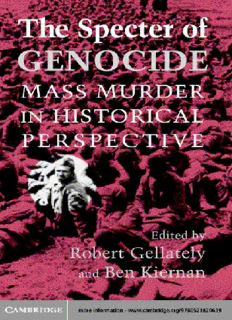
The Specter of Genocide: Mass Murder in Historical Perspective PDF
Preview The Specter of Genocide: Mass Murder in Historical Perspective
This page intentionally left blank “Thiswonderfulcollectionaddressesalltheimportantquestions:Howmod- ern is genocide? Can various cases be compared? Why has genocide been committed by such different kinds of states, from liberal democracies to vi- ciousdictatorships?Andhowcanwebalanceclaimsforjusticewiththeneed forobjectivescholarship?Everyoneshouldreadthisbook.Itisanemotion- allywrenchingexperience,andonethatwillmakeeveryreaderthinkabout modernhumanhistoryinwaysfewofuslearnedinschool.” – Daniel Chirot, Professor of International Studies and Sociology, UniversityofWashington “The comparative study of genocide is an evolving field characterized by great complexity and often competing approaches, dispositions, and inter- pretations.TheeditorsofTheSpecterofGenocideclearlysucceedinpreserving thespecificityoftheindividualcaseswhilealsodemonstratingthenecessity and worth of comparative analysis. Without ignoring the past, the volume focusesontheageofmodernityandthedirectrelationshipbetweenideology, statepower,andtotalwarandtheperpetrationofgenocidalacts.Itissureto findbroadapplicationinscholarshipandintheclassroom.” –RichardG.Hovannisian,AEFChairinModernArmenianHistory, UCLA The Specter of Genocide mass murder in historical perspective Genocide, mass murder, and human rights abuses are arguably the most perplex- ing and deeply troubling aspects of recent world history. This collection of essays by leading international experts offers an up-to-date, comprehensive history and analysisofmultiplecasesofgenocideandgenocidalacts,withafocusonthetwen- tiethcentury.ThebookcontainsstudiesoftheArmeniangenocide,thevictimsof Stalinistterror,theHolocaust,andimperialJapan.Severalauthorsexplorecolonial- ismandaddressthefateoftheindigenouspeoplesinAfrica,NorthAmerica,and Australia.Aswell,thereisextensivecoverageofthepost-1945period,includingthe atrocitiesintheformerYugoslavia,Bali,Cambodia,Ethiopia,Rwanda,EastTimor, andGuatemala.Thebookemphasizestheimportanceofcomparativeanalysisand theoreticaldiscussion,anditraisesnewquestionsaboutthedifficultchallengesfor modernityconstitutedbygenocideandothermasscrimes. RobertGellatelyisStrasslerProfessorinHolocaustHistoryatClarkUniversity.His previous books include Backing Hitler (2001) and The Gestapo and German Society (1990).Hecoedited,withNathanStoltzfus,SocialOutsidersinNaziGermany(2001) and,withSheilaFitzpatrick,AccusatoryPractices(1997). Ben Kiernan is A. Whitney Griswold Professor of History and Director of the Genocide Studies Program at Yale University. He is the author of The Pol Pot Regime(1996;2nded.,2002)andHowPolPotCametoPower(1985)andtheeditor ofGenocideandDemocracyinCambodia(1993). The Specter of Genocide mass murder in historical perspective Editedby robert gellately ClarkUniversity ben kiernan YaleUniversity Cambridge, New York, Melbourne, Madrid, Cape Town, Singapore, São Paulo Cambridge University Press The Edinburgh Building, Cambridge , United Kingdom Published in the United States of America by Cambridge University Press, New York www.cambridge.org Information on this title: www.cambridge.org/9780521820639 © Cambridge University Press 2003 This book is in copyright. Subject to statutory exception and to the provision of relevant collective licensing agreements, no reproduction of any part may take place without the written permission of Cambridge University Press. First published in print format 2003 - isbn-13 978-0-511-06176-9 eBook (NetLibrary) - isbn-10 0-511-06176-5 eBook (NetLibrary) - isbn-13 978-0-521-82063-9 hardback - isbn-10 0-521-82063-4 hardback isbn--13 978-0-521-52750-7 paperback - isbn-10 0-521-52750-3 paperback Cambridge University Press has no responsibility for the persistence or accuracy of s for external or third-party internet websites referred to in this book, and does not guarantee that any content on such websites is, or will remain, accurate or appropriate. Contents ListofContributors pageix Acknowledgments x introduction 1 TheStudyofMassMurderandGenocide RobertGellatelyandBenKiernan 3 parti: genocide and modernity 2 Twentieth-CenturyGenocides:UnderlyingIdeological ThemesfromArmeniatoEastTimor BenKiernan 29 3 TheModernityofGenocides:War,Race,andRevolutionin theTwentiethCentury EricD.Weitz 53 4 SeekingtheRootsofModernGenocide:OntheMacro-and MicrohistoryofMassMurder OmerBartov 75 5 GenocideandtheBodyPoliticintheTimeofModernity MarieFleming 97 partii: indigenous peoples and colonial issues 6 GenocidesofIndigenousPeoples:RhetoricofHumanRights ElazarBarkan 117 7 MilitaryCultureandtheProductionof“FinalSolutions” intheColonies:TheExampleofWilhelminianGermany IsabelV.Hull 141 vii viii Contents 8 “EncirclementandAnnihilation”:TheIndonesianOccupation ofEastTimor JohnG.Taylor 163 partiii: the era of the two world wars 9 UnderCoverofWar:TheArmenianGenocideinthe ContextofTotalWar JayWinter 189 10 TheMechanismofaMassCrime:TheGreatTerrorinthe SovietUnion,1937–1938 NicolasWerth 215 11 TheThirdReich,theHolocaust,andVisionsofSerial Genocide RobertGellately 241 12 ReflectionsonModernJapaneseHistoryintheContext oftheConceptofGenocide GavanMcCormack 265 partiv: genocide and mass murder since 1945 13 “WhentheWorldTurnedtoChaos”:1965andItsAftermath inBali,Indonesia LeslieDwyerandDegungSantikarma 289 14 GenocideinCambodiaandEthiopia EdwardKissi 307 15 ModernGenocideinRwanda:Ideology,Revolution,War, andMassMurderinanAfricanState RobertMelson 325 16 History,Motive,Law,Intent:CombiningHistoricalandLegal MethodsinUnderstandingGuatemala’s1981–1983Genocide GregGrandin 339 17 AnalysisofaMassCrime:EthnicCleansingintheFormer Yugoslavia,1991–1999 JacquesSemelin 353 conclusions 18 InvestigatingGenocide RobertGellatelyandBenKiernan 373 Appendix:ConventiononthePreventionandPunishmentofthe CrimeofGenocide 381 Index 385
Description: